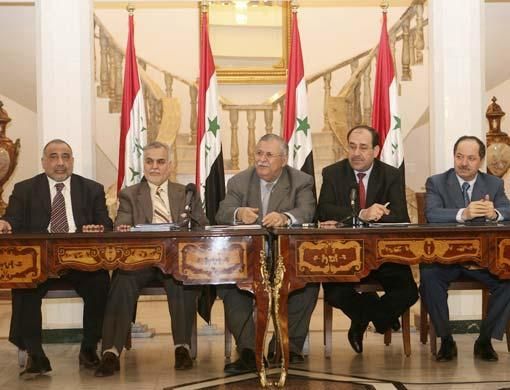Baghdad: Iraq's top Shi'ite, Sunni Arab and Kurdish political leaders announced on Sunday they had reached consensus on some key measures seen as vital to fostering national reconciliation.
The agreement by the five leaders was one of the most significant political developments in Iraq for months and was quickly welcomed by the United States, which hopes such moves will ease sectarian violence that has killed tens of thousands.
But sceptics will be watching for action amid growing frustration in Washington over the political paralysis that has gripped the government of Shi'ite Prime Minister Nuri Al Maliki.
White House spokeswoman Emily Lawrimore congratulated Iraq's leaders on the accord, hailing it in a statement as "an important symbol of their commitment to work together for the benefit of all Iraqis."
The apparent breakthrough comes two weeks before US President George W. Bush's top officials in Iraq present a report that could have a major influence on future American policy in Iraq.
Maliki's appearance on Iraqi television with the four other leaders at a brief news conference was a rare show of public unity.
The other officials present were President Jalal Talabani, a Kurd; Sunni Vice President Tareq Al Hashemi; Shi'ite Vice President Adel Abdul-Mahdi, and Masoud Barzani, president of the semi-autonomous Kurdistan region.
Iraqi officials said the five leaders had agreed on draft legislation that would ease curbs on former members of Saddam Hussein's Baath party joining the civil service and military.
Consensus was also reached on a law governing provincial powers as well as setting up a mechanism to release some detainees held without charge, a key demand of Sunni Arabs since the majority being held are Sunnis.
The laws need to be passed by Iraq's fractious parliament, which has yet to receive any of the drafts.
Yasin Majid, a media adviser to Maliki, told Reuters the leaders also endorsed a draft oil law, which has already been agreed by the cabinet but has not yet gone to parliament.
But a statement from Talabani's office said more discussions were needed on the draft oil law and constitutional reforms. Committees had also been formed to try to ensure a "balance" of Shi'ites, Sunni Arabs and Kurds in government.
The oil law is seen as the most important in a package of measures stalled by political infighting in Maliki's government.













